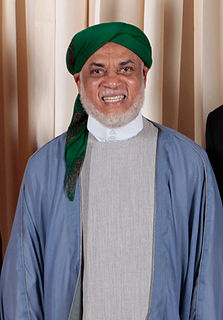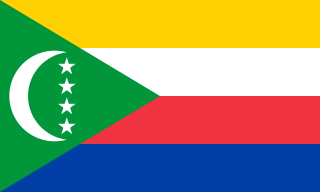
The Camp of the Autonomous Islands was a political alliance in the Comoros. It advocated for greater autonomy for the three islands and for more power to be given to the islands' governors.

Ahmed Abdallah Mohamed Sambi is a Comorian Islamic leader and politician, and former President of Comoros. He is popularly known as 'Ayatollah'. After easily winning the 14 May 2006 presidential election with 58.02% of the national vote, Sambi was inaugurated as President of the Union of the Comoros on 26 May 2006. It was the first peaceful transfer of power in the history of the Comoros.

The following outline is provided as an overview of and topical guide to Comoros:

An independence referendum was held in the Comoros on 22 December 1974. The overall result was a strong "yes" vote, with 94.57% of voters voting for independence and almost all the "no" votes being cast in Mayotte, where there was a majority for remaining under French control. In contrast, on Mohéli only five out of 6,059 votes were against independence. Voter turnout was 93.3%.

Presidential elections were held in the Comoros on 30 September 1984. Incumbent President Ahmed Abdallah of the Comorian Union for Progress was the only candidate, and received the support of 99.4% of voters.

Parliamentary elections were held in the Comoros on 22 November 1992, with a second round on 29 November 1992. Due to electoral irregularities in the initial elections, there were also by-elections in six of the 42 constituencies on 13 and 20 December.

The Comorian passport is issued to citizens of the Union of the Comoros for international travel. As of 1 January 2017, Comorian citizens had visa-free or visa on arrival access to 48 countries and territories, ranking the Comorian passport 88th in terms of travel freedom according to the Henley visa restrictions index.

The Juwa Party is a political party in the Comoros.

The Democratic Rally of the Comoros is a political party in the Comoros led by Mouigni Baraka, Governor of Grande Comore.

The Party for the Comorian Agreement is a political party in the Comoros.

The Islands' Fraternity and Unity Party is a political party in the Comoros.





